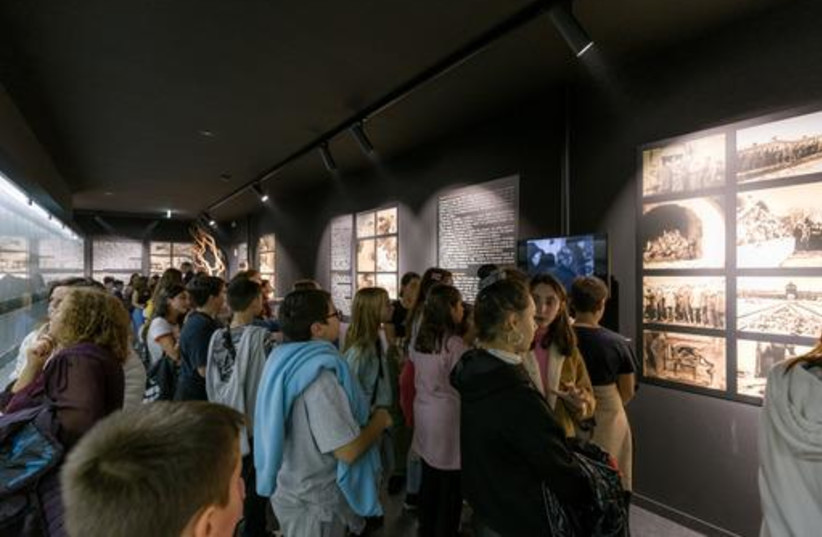The Holocaust Museum of Porto, in Portugal, received 1,000 schoolchildren and teens this week ahead of International Holocaust Remembrance Day in order for the students, aged 10-16, to listen to testimonies from survivors.
The Porto Holocaust Museum looks at Jewish life before the Nazis came to power and the process of how the Nazis attempted to destroy the Jewish people in phases. The museum features exhibits on the Nazi party, the Ghettos, concentration camps, Jewish refugees, and the post-war Jewish liberation efforts in establishing the state of Israel.
"For some members of my family, life ended in the extermination camps, and others were shot by firing squads after being forced to dig a mass grave.”
Luísa Cymerman Finkelstein
The museum also holds recreations of the Auschwitz concentration camp dormitories, a name room displaying the names of those murdered, a memorial room and much more. Footage of the tragedy is also shown in videos around the museum.
Carla Sequeira, a teacher from Lisbon who visited the museum in Porto with 120 students aged 14/15 told the Jerusalem Post that, "this experience teaches them that Humanity cannot lose its historical memory as this could lead to the repetition of these horrors. Peace only persists if there is dialogue, respect and tolerance.”

Reflecting on the importance of continued Holocaust education, Gabriel Senderowicz, the President of the Jewish community of Porto said: “we saw recently in Portugal that antisemitism is the rejection of Jewish people, the Jewish principles, synagogue Jews, business Jews, and all Jews who are not fully converted to modernism and its values.
"The European Union will certainly manage to promote the return of the Jewish people, their culture and religion. However, as soon as Jewish communities start making a strong mark in European territory, the influential antisemites in society will attempt to destroy Jewish life bit by bit, using the same myths and methods employed in the past.”
Senderowicz's comments come after a year of conflict between the Portuguese government and the Jewish community of Porto. The community has alleged that the government is restricting access to Sephardic Jews, who left the region due to antisemitic persecution, their citizenship. In 2022, the government of Portugal also arrested community Rabbi Daniel Litvak for helping a Russian Oligarch access Portuguese citizenship; which the government alleged the Russian was not entitled to.
'Life ended in the extermination camps'
Among the testimonies shared with the hundreds of children were stories of family members lost and the ongoing need for Holocaust education.
Luísa Cymerman Finkelstein recounted to the students that “for some members of my family, life ended in the extermination camps, and others were shot by firing squads after being forced to dig a mass grave.”
Meanwhile, survivor Josef Lassman said, “My father never said a word about what happened during the Shoah. He preferred to move on, without looking back. He was then 19 years old and all his family members had been killed.
"Regarding my mother, she was in Auschwitz, in the experimentation block. She described what happened to her, her sister, parents and family before, during and after the Shoah. I don’t know if there is any testimony so complete and so moving.”
Eta Rabinowicz Pressman Wright remembered her “mother’s sister and brothers were all killed, their children too. In one case, the porter of the building wanted to save the children but they refused and said they wanted to go with their parents. They also died. The only surviving brother was imprisoned by the Soviets in a gulag in Siberia.”
The Nazis spared no Jew
Michael Leo Rothwell, whose parents greatly contributed to Germany prior to the Holocaust, shared his story as a tragic reminder that Jews can never truly be safe.
He said: “My grandparents were good German patriots and loved their country. Two of my great-uncles gave their lives for the Fatherland during the First World War. When the Nazis came to power, my grandparents became unwanted aliens. In 1943 they were transported like cattle to Auschwitz, split up, subject to every possible abuse and murder.”
Deborah Lieberman Walfrid Elijah added “The Holocaust must be recounted by the victims. My mother was an orphan when she reached Argentina and my father was forced to play the violin in the Theresienstadt propaganda camp. I had no grandparents when I was born. They were all executed in Poland, after their heads were shaved, numbers were tattooed on their arms, and they were used as slave labor.”
Jonathan Lackman added “My grandfather escaped from Treblinka and my grandmother, who had typhus, was rescued from the Bergen-Belsen concentration camp in northern Germany, where Anne Frank died. I will always share their stories.”
